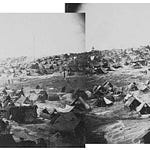Originally published on November 28, 2023 (Episode 343)
Introduction
In his Dictionary of the English Language (1755), Samuel Johnson never defined the words Saxon, Angle, or Anglo-Saxon. But Noah Webster’s 1828 American Dictionary did: “adjective. Pertaining to the Saxons, who settled in England, or English Saxons.”
Something had changed between Johnson and Webster—not only the American Revolution, but their different perspectives on identity, language, and history. By the early 19th century, Anglo-Saxon was already carrying cultural, political, and even ideological baggage.
The term has continued to evolve, raising questions not only about the early medieval peoples it once described, but about how we construct identities in the present. With me to discuss the history of the definition and the ideology of Anglo-Saxon is Rory Naismith.
About the Guest
Rory Naismith is Professor of Early Medieval English History at the University of Cambridge, Fellow of Corpus Christi College, and Friend of Historically Thinking. His books include Citadel of the Saxons: The Rise of Early London and Making Money in the Early Middle Ages, the last of which we discussed here.
For Further Investigation
Content, S., and Williams, H., “Creating the Pagan English, from the Tudors to the Present Day,” in Signals of Belief in Early England: Anglo-Saxon Paganism Revisited, ed. M. Carver, A. Sanmark and S. Semple (Oxford, 2010), 181–200.
Foot, S., “The Making of Angelcynn: English Identity before the Norman Conquest,” Transactions of the Royal Historical Society, 6th ser., 6 (1996), 25–50.
Frantzen, A. J., and Niles, J. D. (eds.), Anglo-Saxonism and the Construction of Social Identity (Gainesville, FL, 1997).
Horsman, R., Race and Manifest Destiny: The Origins of American Racial Anglo-Saxonism (Cambridge, MA, 1981).
Kidd, C., British Identities before Nationalism: Ethnicity and Nationhood in the Atlantic World 1600–1800 (Cambridge, 1999).
Mandler, P., The English National Character: The History of an Idea from Edmund Burke to Tony Blair (New Haven, 2006).
Niles, J., The Idea of Anglo-Saxon England 1066–1901 (Oxford, 2015).
Rubinstein, S., “Anglo-Saxon Extremists,” The Critic, June 2023.
Rambaran-Olm, M., “History Bites: Resources on the Problematic Term ‘Anglo-Saxon’,” three-part series on Medium, 2020.
Rambaran-Olm, M., “Misnaming the Medieval: Rejecting ‘Anglo-Saxon’ Studies,” History Workshop, Nov. 2019.
Rambaran-Olm, M., and Wade, E., “The Many Myths of the Term ‘Anglo-Saxon’,” Smithsonian Magazine, July 2021.
Sewer, A., “Anglo-Saxon is What You Say when ‘Whites Only’ is Too Inclusive,” The Atlantic, Apr. 2021.
Williams, H., “The Fight for ‘Anglo-Saxon’,” Aeon, May 2020.
Wood, M., “As a Racism Row Rumbles on, is it Time to Retire the Term ‘Anglo-Saxon’?” History Extra, Nov. 2019.
💬 Listen & Discuss
What does the long history of the term Anglo-Saxon reveal about the ways language shapes identity? Should historians continue to use the term—or retire it? Share your thoughts in the comments, and pass this episode along to someone interested in early medieval history, identity, and historical terminology.











